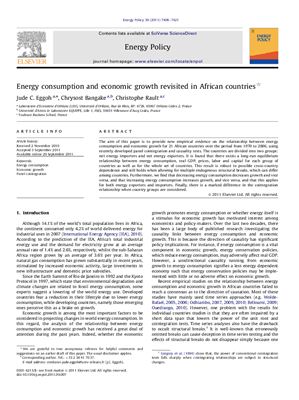На английском языке. Статья опубликована в ж. Energy Policy, 2011,
V. 7408-7429.
The aim of this paper is to provide new empirical evidence on the relationship between energy consumption and economic growth for 21 African countries over the period from 1970 to 2006, using recently developed panel cointegration and causality tests. The countries are divided into two groups: net energy importers and net energy exporters. It is found that there exists a long-run equilibrium relationship between energy consumption, real GDP, prices, labor and capital for each group of countries as well as for the whole set of countries. This result is robust to possible cross-country dependence and still holds when allowing for multiple endogenous structural breaks, which can differ among countries. Furthermore, we find that decreasing energy consumption decreases growth and vice versa, and that increasing energy consumption increases growth, and vice versa, and that this applies for both energy exporters and importers. Finally, there is a marked difference in the cointegration relationship when country groups are considered.
The aim of this paper is to provide new empirical evidence on the relationship between energy consumption and economic growth for 21 African countries over the period from 1970 to 2006, using recently developed panel cointegration and causality tests. The countries are divided into two groups: net energy importers and net energy exporters. It is found that there exists a long-run equilibrium relationship between energy consumption, real GDP, prices, labor and capital for each group of countries as well as for the whole set of countries. This result is robust to possible cross-country dependence and still holds when allowing for multiple endogenous structural breaks, which can differ among countries. Furthermore, we find that decreasing energy consumption decreases growth and vice versa, and that increasing energy consumption increases growth, and vice versa, and that this applies for both energy exporters and importers. Finally, there is a marked difference in the cointegration relationship when country groups are considered.

